Pischelsdorf Industrial Park: A place of synergy effects
Donauchem operates a production plant and the most modern chemical distribution warehouse in Austria at the Pischelsdorf Industrial Park.
In this article we give you an insight into the history of the production site in Pischelsdorf near Tulln, what exactly Donauchem does here and how we work together with partner companies.
The origins of the Pischelsdorf Industrial Park
The history of the industrial park began in 1916 with the founding of the company Skodawerke Wetzler AG and the construction of a powder factory in Moosbierbaum near Pischelsdorf. Only a few months after production started, the war ended and with it the production of explosives.
From the 1920s onwards, the powder factory began to be converted into a chemical industrial plant. The sulphuric acid and superphosphate plant went into operation in 1924, but a detergent called "Versale", the plastic "Resan" and many other chemical products were also produced at that time. In just a few years, the site developed into Austria's most important production facility for basic chemical products.

The Moosbierbaum factory as the main site and the factory premises in Pischelsdorf with harbour on the Danube. © Donau Chemie AG
In 1938, the Skodawerke merged with other chemical companies to form Donau Chemie AG and became part of the German chemical giant IG-Farben AG. In the following years, the Donau Refinery (DORO plant) and a hydroforming plant for aviation fuel production were built in Moosbierbaum.
At the same time, a new plant for the production of sulphuric acid and chlorosulphonic acid was built in Pischelsdorf. Even at that time, the transhipment site with a length of around 650 m on the Pischelsdorf site played an important role. Crude oil was delivered there from Romania by tank barges and then transported via a pipeline to the refinery in Moosbierbaum.
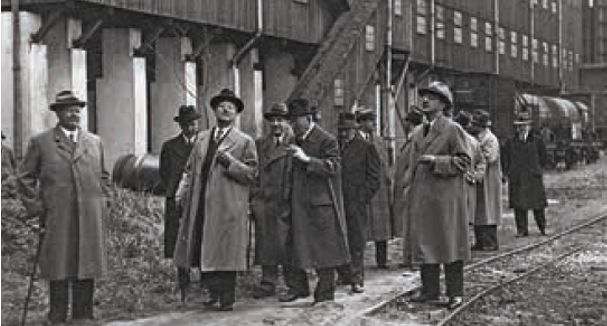
Official commissioning of the new sulphuric acid plant by Federal Chancellor Kurt Schuschnigg in October 1937 © Donau Chemie AG
At the end of the Second World War, a large part of the facilities, including the central laboratory and the power station, were destroyed by bombs and fire. Donau Chemie AG came under public administration and was not privatised again until 1958.
In 1961, the construction of the new sulphuric acid plant in Pischelsdorf began, followed by the fertiliser granulation plant and a modern phosphoric acid plant in 1964. The production of environmentally friendly phosphate fertilisers started in 1967, and another sulphuric acid plant, latex production and gypsum board production were added in 1972 and 1973 respectively.
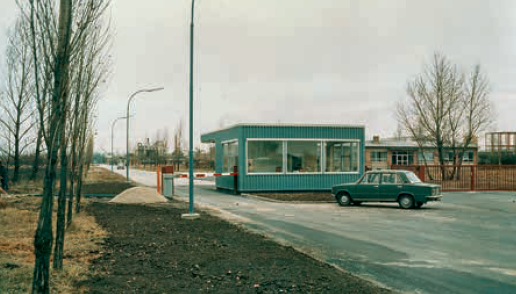
Plant entrance in the 1970s © Donau Chemie AG
The takeover of Donau Chemie AG in the form of a management buy-out by Alain de Krassny in 1997 finally laid the foundation for developing the plant from a pure production site into an industrial park. 2006 saw the start of construction of the new, modern distribution and production site of Donauchem. At the same time, the expansion of the Pischelsdorf site into an "industrial park" began with the settlement of the Agrana company.
"We are not focused on short-term profit, but on long-term existence. The first 100 years of the Pischelsdorf site should not be the last. That is why we have invested a lot in the plant and the industrial park in the past and will continue to do so."
Alain de Krassny on the occasion of the 100th anniversary of the Pischelsdorf industrial park (2016).
Donauchem: located in Pischelsdorf since 2008
Today, more than 3,000 chemicals, liquid multi-component mixtures and finished products such as antifreeze or special cleaners are produced or filled in the Donauchem production building. Customised mixtures in particular represent a growing segment, as more and more companies are purchasing ready-made mixtures based on their own recipes from Donauchem instead of individual raw materials.
Another focus of Donauchem is the distribution of basic and special chemicals as well as their filling in commercially available containers - from canisters to drums and IBCs to tank trucks. Donauchem also supplies Pischelsdorf-based Agrana and Air Liquide Austria with raw materials. A synergy from which both sides benefit.
Donauchem produces and trades a total of 50,000 tonnes of acids, alkalis, salts, solvents, mixed products as well as specialities for the food and technical sectors per year. In addition to production and distribution, Donauchem offers customer services such as consulting and support for chemical users and professional disposal.
The Pischelsdorf Industrial Park is located directly on the Danube and is only 50 kilometres from Vienna © Donau Chemie AG
Partner companies in the Pischelsdorf Industrial Park
Of the more than 120 hectares of company grounds, 60 hectares are currently used by the Donau Chemie Group as well as leased-in companies. A total of seven companies are currently located in the industrial park:
Donau Chemie AG has been producing high-purity sulphuric acid at the Pischelsdorf plant for several decades. Furthermore, it operates the reactivation of activated carbon, the distribution of basic and special chemicals as well as the storage of raw materials and finished products at the site.
In 2007, the family-run logistics professional
Schildecker Transports moved to Pischelsdorf to be closer to its customers. As a long-standing transport partner of the companies at the site, Schildecker is a competent business partner for the transport of hazardous goods.
Since May 2008,
Agrana has been producing bioethanol, animal feed and biofertiliser from grain and by-products of the wheat starch plant in Pischelsdorf. In the wheat starch plant, wheat starch, gluten and wheat bran are extracted from wheat.
The CO2 produced during the production of bioethanol is supplied by Agrana to
Air Liquide Austria. From this, the world's largest gas producer has been extracting high-purity carbon dioxide (CO2) for applications in the food and beverage industry since 2012.
Timac Agro is another fertiliser producer located at the Pischelsdorf industrial park. The plant, which belonged to the Donau Chemie Group until 2005, is part of the internationally active Roullier Group and produces speciality fertilisers, feed supplements and DC fertilisers.
The subsidiary of the British speciality chemicals manufacturer
Synthomer is engaged in the production of latex for the paper and textile industry, including the storage of the monomer raw materials required for this (such as styrene, butadiene, acrylic acid, acrylonitrile), catalysts as well as the dispersion products. The plant was sold by BASF to Synthomer Austria in 2018.
The infrastructure of Donauchem in Pischelsdorf
At the Pischelsdorf industrial park, Donauchem benefits from the comprehensive infrastructure, services and synergies. Whether porter, telephone exchange, workshops, laboratory, energy, logistics services or material management - everything is available on the premises.
Electricity and heat from our own energy cycle
Donauchem runs its plant entirely on green energy. Since 2004, the waste heat generated during the production of sulphuric acid at Donauchem has been used. By means of a steam turbine, heat is converted into steam and used to generate electricity. The plant supplies an average of 45 to 48 million kilowatt hours of electricity per year.
At the same time, the plants can be cooled in this way. This is made possible by the energy cycle at the Pischelsdorf plant, to which Donauchem and the partner plants are connected. The infrastructure (pipelines, etc.) for this is operated by Donau Chemie AG. However, if there is ever a shortage of energy, VERBUND supplies electricity from the neighbouring Danube power plant in Altenwörth, thus ensuring a stable supply.
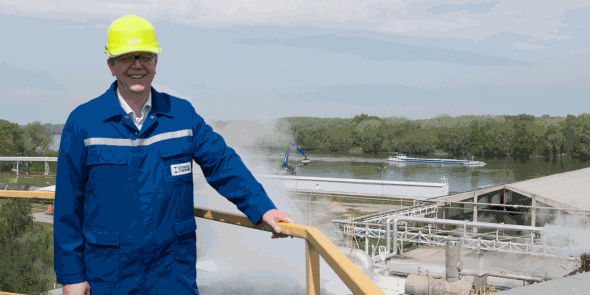
Plant manager Alexander Liska ensures a smooth energy supply in Pischelsdorf © VERBUND
ADR transport company at the site
The Pischelsdorf industrial park is optimally located from a logistical point of view with its direct connection to ship, rail and road. Donau Chemie has its own railway network of over 15 km and 3 locomotives and moves around 1.2 million tonnes of goods per year. However, Donauchem mainly procures and delivers its products via tank wagons or general cargo (specialities), in rare cases via tank wagons.
An important cooperation partner directly at the site is the company Schildecker Transporte. Since February 2021, the logistics professional has been working exclusively for Donauchem with its new multi-chamber tanker. The tank of the "Milchwagerl" is equipped with state-of-the-art tank technology and five internal chambers.
In addition to its fleet, Schildecker also operates a filling station and a wagon and truck cleaning facility in Pischelsdorf, which is supplied with industrial waste heat from Donauchem.
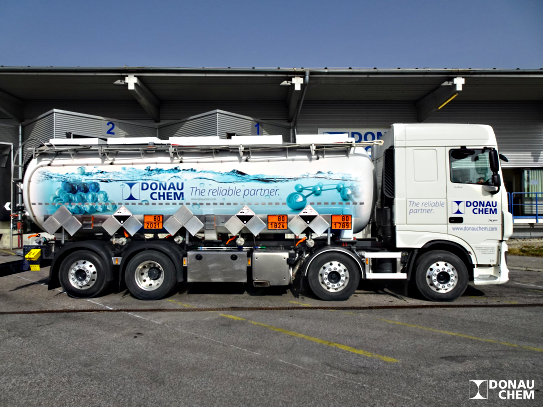
The new type of tank truck with its composite tank offers many new possibilities in the chemical distribution of non-packaged liquids. © Donauchem
More safety for customers thanks to high storage capacities
Donauchem's chemical distribution warehouse in Pischelsdorf with its large-scale infrastructure is one of the most modern locations in Europe. The large storage capacities allow chemicals to be bunkered for customers so that they can be delivered without problems in the event of bottlenecks.
The warehouse in Pischelsdorf currently has a storage area of 12,000 m2 with almost 14,000 pallet spaces in high-bay racks, plus around 2,800 m3 of tank capacity for solvents, acids and alkalis. In the wake of the tense global economic situation, the warehouse was optimised last year, increasing on-site stock levels and significantly expanding the scope in the event of bottleneck situations on the world market.
Quality control and R&D on site
Donau Chemie AG's central research laboratory has its own development laboratory and is used by Donauchem for quantitative and qualitative analyses. The laboratory's experts are also available for the development of new products. With modern laboratory equipment such as ion chromatograph (IC), emission spectrometer (ICP-OES) or sample changer, ingredients and additives can be determined quickly and comprehensive quality controls can be carried out. For example, chlorates contained in disinfectants can be analysed in 30 minutes.
Equipped for incidents with workshops and a spare parts store
In addition to licensed workshops for motor vehicles, electronics and plastics, the industrial site also houses a carpentry workshop and a technical office for planning and construction services. A spare parts warehouse with more than 5,000 different articles is also directly on site. If there are technical problems in production or if a repair is necessary, production downtimes can be reduced to a minimum thanks to the rapid availability of spare parts.
Company fire brigade with high competence
The company fire brigade headed by Donau Chemie AG specialises in harmful substances and consists of 80 professionally trained employees. The special equipment is not only used on the company premises, but is also used throughout Austria in case of need in the course of the Transport Accident Information Assistance System (TUIS).
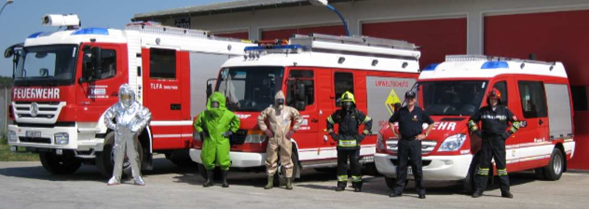
The Donau Chemie company fire brigade is equipped for all kinds of operations. © Donau Chemie AG
Conclusion: Pischelsdorf Industrial Park
The Pischelsdorf Industrial Park offers advantages in many respects - for the local companies, but also for customers. Donauchem still has a lot of plans for the coming years and there is also enough space for new partner companies. To use the words of Alain de Krassny on the occasion of the 100-year anniversary of the industrial park in 2016: "We are not focused on short-term profit, but on long-term existence. The first 100 years of the Pischelsdorf site should not be the last. That is why we have invested a lot in the plant and the industrial park in the past and will continue to do so."
 www.donauchem.at
Related Links:
Pischelsdorf Industrial Park
www.donauchem.at
Related Links:
Pischelsdorf Industrial Park